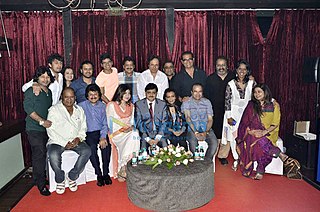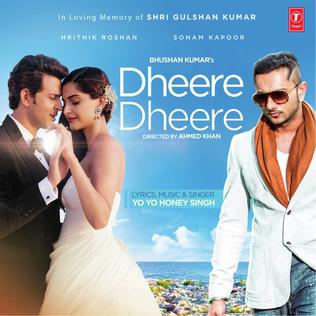
Javed Akhtar is an Indian screenwriter, lyricist and poet. Known for his work in Hindi cinema, he has won five National Film Awards, and received the Padma Shri in 1999 and the Padma Bhushan in 2007, two of India's highest civilian honours.

Kedarnath Bhattacharya, professionally known as Kumar Sanu, is an Indian playback singer who primarily sings in Hindi film songs. Apart from Hindi, he has also sung in other languages including Bengali, Marathi, Nepali, Assamese, Bhojpuri, Gujarati, Manipuri, Telugu, Malayalam, Kannada, Tamil, Punjabi, Odia, Chhattisgarhi, Urdu, Pali, English and his native language Bengali, both in West Bengal and Bangladesh. He holds the record for winning five consecutive Filmfare Award for Best Male Playback Singer from 1991 to 1995. He holds the Guinness Book of world records since 1993 for recording the maximum number of songs in a single day.

Asrar ul Hassan Khan, better known as Majrooh Sultanpuri, was an Indian Urdu poet and lyricist in India's Hindi language film industry. He wrote Hindustani lyrics for numerous Hindi film soundtracks.

Phool Aur Kaante is a 1991 Indian Hindi-language action-romance film directed by Kuku Kohli. It stars Ajay Devgan, Madhoo, Aruna Irani, Jagdeep and Amrish Puri among others. The film marked the debut of Devgan, son of late stunt and action choreographer Veeru Devgan, and Madhoo, cousin of actress Hema Malini. The film was a superhit and won Devgan the Filmfare Award for Best Male Debut for 1991. This film was remade in Telugu as Varasudu and in Odia as Dhire Dhire Prema Hela. The film is loosely based on the Malayalam film Parampara directed by Sibi Malayil where Mammootty plays dual roles as Johnny, the protagonist and Lawrence, his father.
The Filmfare Lyricist Award is given by the Filmfare magazine as part of its annual Filmfare Awards for Hindi films.

Salim Abdul Rashid Khan is an Indian actor, film producer and screenwriter. He wrote the screenplays, stories and scripts for numerous Bollywood films. Khan is one half of the prolific screenwriting duo of Salim–Javed, along with Javed Akhtar. The duo were among the first Indian screenwriters to achieve star status in Hindi cinema, and became the most successful Indian screenwriters of all time. While working together, Salim Khan was largely responsible for developing the stories and characters, whereas Javed Akhtar was largely responsible for developing the dialogues.

Nadeem–Shravan are Indian music directors duo in the Bollywood film industry of India. They derive their name from the first names of Nadeem Akhtar Saifi and Shravan Kumar Rathod.
Nasreen Munni Kabir is an India-born television producer, director and author based in the U.K. She is best known for producing an annual season of Indian films for the British terrestrial television channel Channel 4.

Hindi film songs, more formally known as Hindi Geet or filmi songs and informally known as Bollywood music, are songs featured in Hindi films. Derived from the song-and-dance routines common in Indian films, Bollywood songs, along with dance, are a characteristic motif of Hindi cinema which gives it enduring popular appeal, cultural value and context. Hindi film songs form a predominant component of Indian pop music, and derive their inspiration from both classical and modern sources. Hindi film songs are now firmly embedded in North India's popular culture and routinely encountered in North India in marketplaces, shops, during bus and train journeys and numerous other situations. Though Hindi films routinely contain many songs and some dance routines, they are not musicals in the Western theatrical sense; the music-song-dance aspect is an integral feature of the genre akin to plot, dialogue and other parameters.

Aashiqui (transl. Romance) is a 1990 Indian Hindi musical romantic drama film and first installment of Aashiqui series directed by Mahesh Bhatt, starring Rahul Roy, Anu Aggarwal and Deepak Tijori in pivotal roles. The film was known for its music, by composer duo Nadeem–Shravan establishing their careers along with that of singer Kumar Sanu and music label T-Series.
Filmi qawwali is a form of qawwali music found in the Lollywood, Dhallywood, Tollywood, and Bollywood film industries.

Hasrat Jaipuri, born Iqbal Hussain was an Indian poet, who wrote in the Hindi and Urdu languages. He was also a renowned film lyricist in Hindi films, where he won the Filmfare Awards for Best Lyricist twice – in 1966 and then in 1972.

Shitala Pandey, better known as Sameer Anjaan or Sameer, is an Indian lyricist, known for writing songs predominantly for Bollywood films. He is a Guinness World Record holder for writing the most songs.

Dhartiputra is a 1993 Hindi film, directed by Iqbal Durrani, and was the debut Bollywood film of Mammootty in the lead role. The film has Jaya Prada, Rishi Kapoor and Nagma in supporting roles. It was produced by Dinesh Patel, who earlier produced Phool aur Kaante and Divya Shakti, and the music was written by Nadeem-Shravan. The film was declared a semi hit at the box office and was the 24th highest-grossing film of 1993.
The 37th Filmfare Awards were held in 1992.
Inder Raj Anand was an Indian film dialogue and screenwriter in Hindi cinema, who worked on many Raj Kapoor films, starting with Aag (1948), Aah (1953), Anari (1959) and Sangam (1963). While formally referred to as a writer for Hindi films, he was actually an Urdu writer, writing his scripts and dialogues in Urdu.
Parsi theatre is a generic term for an influential theatre tradition, staged by Parsis, and theatre companies largely-owned by the Parsi business community, which flourished between 1850 and the 1930s. Plays were primarily in the Hindustani language, as well as Gujarati to an extent. After its beginning in Bombay, it soon developed into various travelling theatre companies, which toured across India, especially north and western India, popularizing proscenium-style theatre in regional languages.

"Dheere Dheere" is a song by the Indian recording artist Yo Yo Honey Singh. He recorded this song on his iPhone and composed it on his laptop during his Bipolar disorder. The track was released on 31 August 2015 as a single on Hotstar. It is a cover version of the Bollywood filmi-ghazal song "Dheere Dheere Se" music by Nadeem–Shravan, lyrics by Rani Malik, Singing by Anuradha Paudwal & Kumar Sanu, from the 1990 all-time blockbuster Bollywood film soundtrack album Aashiqui. It was released on YouTube by T-Series on 2 September 2015.

The soundtrack to the 1990 Hindi-language romantic musical film Aashiqui features twelve songs composed by Nadeem–Shravan and lyrics written by Sameer, Rani Mallik and Madan Pal. Released by T-Series on 26 December 1989, it became the highest-selling Bollywood soundtrack of all time with around 2 crore units sold. Its success established the duo to become one of the leading music composers in the Hindi film industry.












